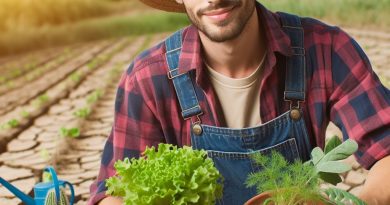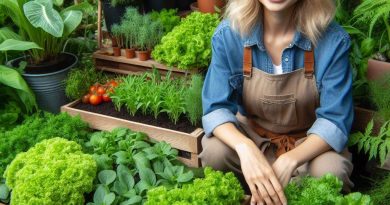Grow Your Own Herbs: A Seasonal Guide
Last Updated on March 2, 2024
Introduction
Growing your own herbs is not only important but also beneficial, and this blog post aims to highlight the reasons why.
Importance of growing herbs
Growing herbs allows you to have access to fresh, flavorful ingredients right at your fingertips.
Benefits of growing herbs at home
By growing herbs at home, you can save money, reduce waste, and have complete control over the quality of your herbs.
Purpose of the blog post
The purpose of this blog post is to provide a seasonal guide on growing your own herbs, offering tips and advice for each season.
Having fresh herbs on hand can elevate the taste of your meals and add a burst of freshness.
Moreover, growing your own herbs allows you to experiment with different flavors and varieties that might not be readily available in stores.
Additionally, it promotes sustainability and reduces the carbon footprint associated with transportation and packaging of store-bought herbs.
Whether you have a small garden or just a sunny windowsill, you can easily grow herbs.
This blog post will provide guidance on choosing the right herbs for each season and offer tips for successful cultivation.
From sowing seeds to harvesting, you’ll learn about the different stages of herb growth and how to care for your plants.
Furthermore, we will explore various ways to preserve the herbs you grow, enabling you to enjoy them long after the growing season ends.
So, join us on this herb-filled journey and discover the joys of growing your own herbs, season by season!
Benefits of Growing Your Own Herbs
Growing your own herbs offers a plethora of advantages that go beyond just having fresh flavors at your fingertips.
When you cultivate your own herbs, you’re not only enhancing the taste of your dishes but also embracing a more sustainable and cost-effective approach to cooking.
Fresh and Flavorful Herbs for Cooking
There’s nothing quite like the taste of freshly picked herbs straight from your garden.
The vibrant flavors and aromas elevate any dish, adding a touch of freshness that store-bought herbs often lack.
Whether it’s basil for your pasta, mint for your mojitos, or rosemary for your roasted potatoes, homegrown herbs bring an unmatched depth of flavor to your culinary creations.
Cost-Effective Compared to Buying Herbs
Buying herbs from the grocery store can quickly add up, especially if you’re someone who enjoys experimenting with different flavors in your cooking.
By growing your own herbs, you can significantly reduce your grocery expenses while still enjoying a variety of fresh herbs year-round.
Plus, you’ll have the satisfaction of knowing exactly where your food comes from and how it’s been grown.
Control Over the Quality and Pesticides Used
When you grow your own herbs, you have complete control over the quality and cultivation practices used.
You can choose to grow your herbs organically, free from harmful pesticides and chemicals, ensuring that you’re consuming the healthiest and most flavorful ingredients possible.
This level of control is particularly important for those with dietary restrictions or health concerns.
Convenient Access to Herbs Whenever Needed
Having a herb garden right outside your door provides unparalleled convenience.
No more last-minute trips to the store or settling for dried herbs when a recipe calls for fresh.
With your own herb garden, you can simply step outside and snip off the exact amount of herbs you need, whenever you need them, ensuring that your dishes are always bursting with flavor.
Potential Health Benefits Associated with Herbs
In addition to their culinary appeal, many herbs are also packed with health benefits.
From boosting immunity to aiding digestion, herbs have been used for centuries as natural remedies for various ailments.
By incorporating fresh herbs into your diet, you can harness their medicinal properties and support your overall health and well-being.
In conclusion, growing your own herbs is not only a rewarding and enjoyable experience but also a practical and beneficial one.
From enhancing the flavor of your dishes to saving money on groceries and promoting better health, cultivating your own herb garden is a decision you won’t regret.
So why wait? Start growing your own herbs today and reap the countless rewards that come with it.
Seasonal Guide for Growing Herbs
Growing your own herbs can be a rewarding and sustainable way to add flavor to your cooking.
By dividing the guide into four seasons, you can ensure that you have fresh herbs year-round.
Spring
- During spring, herbs like basil, chives, dill, and parsley thrive.
- They require plenty of sunlight and moderate temperatures.
- Water them regularly and protect them from late frosts.
- Be vigilant against pests like aphids and diseases like powdery mildew.
Summer
- Summer is the time for rosemary, thyme, mint, and cilantro.
- Make sure they receive full sun and well-drained soil.
- Deep watering and mulching help retain moisture.
- Pinching off flower buds encourages bushier growth.
- Protect them from heat stress and various pests.
Fall
- Fall calls for herbs like sage, lavender, thyme, and oregano.
- They prefer cooler temperatures and slightly less watering.
- Beware of powdery mildew and prevent root rot by avoiding damp soil.
- Harvest before the first frost and dry them indoors for future use.
Winter
- Winter herbs include rosemary, thyme, oregano, and chives.
- Growing them indoors requires sunny windowsills and proper air circulation.
- Water them sparingly and avoid overwatering.
- Low humidity and pest infestations can be challenging, but regular trimming and adequate lighting can promote healthy growth.
With this seasonal guide, you are equipped to successfully grow herbs year-round.
Enjoy the benefits of fresh herbs in your cooking and the satisfaction of nurturing your own garden.
Read: Winter Prep for Your Garden & Farm
Spring
Spring is the perfect season to start growing your own herbs, as they thrive in the warmer temperatures and longer days.
Here are some recommended herbs that you can start with: basil, chives, and cilantro.
Optimal soil and temperature conditions
When it comes to the soil conditions, herbs prefer well-drained soil with a pH level between 6.0 and 7.0.
Make sure to prepare the soil by removing any weeds and adding organic matter for better moisture retention.
Temperature is another crucial factor in herb growth.
Most herbs prefer a temperature range of 60°F to 70°F (15°C to 21°C) during the day and around 50°F (10°C) at night.
Be sure to provide them with enough sunlight for at least 6 hours a day.
Average germination time and harvesting window
Germination time and harvesting window vary for each herb.
Basil, for example, takes around 5 to 10 days to germinate and can be harvested after 40 to 60 days.
Chives and cilantro have a germination time of 7 to 14 days and can be harvested in approximately 30 to 45 days.
To protect your young plants from frost damage, it’s important to keep an eye on the weather forecast.
If frost is predicted, cover your herbs with a frost cloth or plastic sheet to prevent them from freezing.
You can also move potted herbs indoors overnight if necessary.
Tips for avoiding frost damage to young plants
Here are some tips to ensure the successful growth of your herbs during spring:
- Start seeds indoors a few weeks before the last frost date to get a head start on the growing season.
- Harden off seedlings gradually by exposing them to outdoor conditions for a few hours each day before transplanting them outside.
- Water consistently but avoid overwatering, as herbs prefer slightly dry conditions.
- Mulch around the herbs to retain moisture and prevent weed growth.
- Pinch off the tips of your herbs regularly to encourage bushier growth.
- Harvest your herbs frequently to promote continuous growth and prevent them from going to seed.
In short, spring is a wonderful time to start growing your own herbs.
With the right soil and temperature conditions, along with proper care and attention, you can enjoy a bountiful harvest of basil, chives, and cilantro.
Remember to protect your plants from frost and follow the tips provided for successful herb cultivation.
Happy gardening!
Read: Urban Farming: Getting Started in Cities

Summer
During the summer season, there are several herbs that thrive in the warmth and can be easily grown in your garden or indoor pots.
Mint, rosemary, and thyme are highly recommended and versatile herbs to cultivate.
Specific watering needs during hot weather
With the scorching heat of summer, proper watering becomes crucial for the health of your herbs.
It’s essential to provide adequate moisture without overwatering.
- Water your herbs deeply but less frequently, aiming for about one to two inches of water per week.
- Check the soil moisture regularly by inserting your finger about an inch deep into the soil. If it feels dry, it’s time to water.
- Water in the early morning or late evening to minimize evaporation and allow plants to absorb moisture before the direct sun hits.
Protection against pests and diseases
In summer, pests and diseases tend to thrive, posing a threat to your herb garden.
Take preventive measures to protect your plants.
- Inspect your herbs regularly for any signs of pests, such as aphids or spider mites. Remove them manually or use organic pest control methods.
- Provide proper air circulation to prevent fungal diseases. Avoid overcrowding your herbs and trim any dense foliage.
- Mulch around your herbs to suppress weed growth and retain moisture, but be cautious not to pile it against the plant stems.
Techniques for promoting healthy growth and avoiding leggy plants
Healthy growth and preventing leggy plants can be achieved through proper care and maintenance during the summer season.
- Regularly pinch or trim the tips of your herbs to encourage bushier growth and prevent them from becoming spindly.
- Ensure your herbs receive sufficient sunlight, at least 6-8 hours per day, to prevent them from stretching towards the light.
- Fertilize your herbs monthly with a balanced organic fertilizer, following the package instructions to avoid overfeeding.
- Harvest your herbs regularly to prevent them from flowering. Removing flowers redirects the plant’s energy towards foliage growth.
In general, summer is an ideal time to grow herbs like mint, rosemary, and thyme.
By providing proper watering, protecting against pests, and promoting healthy growth, you can enjoy a bountiful harvest of flavorful herbs throughout the season.
Read: Small Garden? Big Savings: Water Efficiency Tips
Fall
In the fall season, there are several herbs that are recommended to grow in your garden.
These include parsley, sage, and dill.
As the temperature drops during the fall, it is important to adjust the watering frequency for your herbs.
They don’t need as much water as during the summer months.
Preparing your herbs for colder weather and potential frost is crucial to ensure their survival.
You can cover them with frost cloth or bring potted herbs indoors.
Tips for proper harvesting and preserving herbs before winter
Proper harvesting and preserving techniques are essential before winter arrives.
Here are some tips to help you preserve the flavors of your herbs:
- Harvest herbs in the morning after the dew has dried, but before the sun is too hot.
- Use sharp pruning shears or scissors to cut the herbs, avoiding any damage to the plants.
- For leafy herbs like parsley, cut the outer stems first, leaving the inner growth to continue growing.
- For herbs with woody stems like sage, cut just above a leaf node to encourage new growth.
- After harvesting, gently wash the herbs to remove any dirt or insects.
- Drying herbs is a popular method of preserving them. Hang bunches of herbs upside down in a cool, dry place away from direct sunlight.
- You can also freeze herbs by mincing them and then placing them in ice cube trays filled with water or olive oil.
- If you prefer a more potent flavor, herbs can be dried using a dehydrator or in the oven on a low temperature.
- Store dried herbs in airtight containers, away from light and humidity, to maintain their freshness.
- Label your containers with the name and date of harvest to keep track of their expiration dates.
- Remember to use your preserved herbs within a year for optimal flavor.
By following these tips, you can ensure that your herbs thrive during the fall season and continue to provide you with fresh flavors throughout the winter months.
Read: Fall Harvest Guide: Best Practices
You Might Also Like: Herb Growing in Pots: The Compact Garden Guide
Winter
During the winter months, when it’s too cold and frosty outside, it’s the perfect time to start an indoor herb garden.
You might be surprised at how well certain herbs can thrive indoors, even during the coldest months.
Here are some recommended herbs for indoor gardening:
Recommended herbs for indoor gardening
- Oregano: This pungent herb is a great addition to your indoor garden. It requires relatively low light and can tolerate cooler temperatures.
- Chives: Chives are easy to grow indoors and can add a mild onion flavor to many dishes. They prefer moderate light and temperature.
- Parsley: Parsley is a versatile herb that can be used in a variety of dishes. It needs bright light and slightly warmer temperatures to thrive indoors.
Providing Sufficient Light and Temperature for Indoor Herbs
One of the challenges of growing herbs indoors during winter is providing them with sufficient light and maintaining the right temperature.
- Place your indoor herb garden near a south-facing window to maximize the available sunlight.
- Consider using artificial grow lights if natural light is limited or inadequate.
- Use a thermometer to monitor the temperature in the growing area and adjust as needed.
Techniques for Preventing Common Indoor Herb Issues
While growing herbs indoors can be rewarding, it’s important to address common issues that can arise:
- Ensure proper air circulation by placing a small fan near your herb plants to prevent fungal diseases.
- Water your herbs sparingly, as overwatering can lead to root rot. Check the moisture level before watering.
- Watch out for pests such as aphids and spider mites. Regularly inspect your plants and use natural remedies or insecticidal soap if necessary.
Harvesting and Using Indoor Herbs During Winter Months
Winter is a great time to harvest and enjoy the fresh flavors of your indoor herbs.
Here are some tips:
- Harvest leaves in the morning when the herb’s essential oils are at their peak.
- Trim the stems above a set of healthy leaves to promote bushier growth.
- Use your harvested herbs in cooking, teas, or even to make homemade herbal remedies.
By growing herbs indoors during the winter, you can have a fresh supply of flavorful herbs all season long.
Experiment with different varieties and enjoy the benefits of indoor gardening!
Conclusion
There are numerous benefits to growing your own herbs.
Not only will you have access to fresh and flavorful ingredients for your cooking, but you will also save money and reduce waste.
Starting your own herb garden is a rewarding and fulfilling experience that allows you to connect with nature and practice sustainable living.
To help you get started, here are some additional resources and references for herb gardening:
- “The Herb Gardener’s Essential Guide: Creating Herbal Remedies and Oils for Health & Healing” by Sandra Kynes.
- “Rodale’s Basic Organic Gardening: A Beginner’s Guide to Starting a Healthy Garden” by Deborah L. Martin.
- “The Complete Book of Herbs: A Practical Guide to Growing and Using Herbs” by Lesley Bremness.
We invite you to share your experiences and ask questions about herb gardening in the comments section below.
Let’s create a community where we can offer support, advice, and inspiration to one another.
Happy growing!


